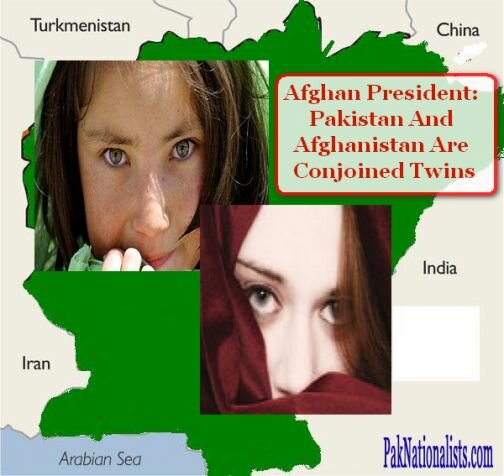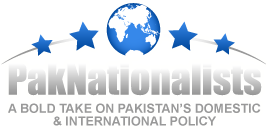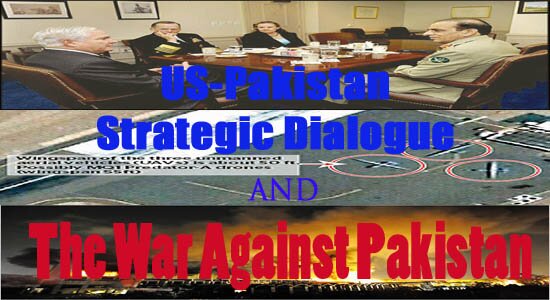
 Print This Post
Print This Post  Email This Post
Email This Post
Have you heard about Allama Iqbal Faculty at Kabul University? Sir Syed Science Faculty Block at Nangarhar University? Liaqat Ali Khan Engineering Faculty at Balkh University? Rehman Baba High School in Kabul? And the sprawling ten-tower Jinnah Hospital Complex in Kabul and the Nishtar Kidney Hospital in Jalalabad? For over three decades, Pakistan has directly and indirectly spent billions of dollars on three million Afghan refugees, giving them jobs, housing, healthcare, training, education and subsidized food and services. Today, the most productive workforce in Afghanistan is Pakistan-trained.
- Pakistan will issue 250,000 multiple entry visas to applicants across Afghanistan in 2010
- 28,000 Afghans have studied in Pakistani schools, colleges and universities in the past 30 years; Islamabad has longstanding policy of educating the children of Afghan refugees
- About 500,000 Afghan children attend schools in Pakistan
- The most successful professionals in today’s Afghan society had studied in Pakistan
- Afghan graduates from Pakistani universities receive higher salaries than graduates from any other country in the region
- Every single day in 2009, 52,000 Afghans entered Pakistan for business, education and tourism
- Tajik, Uzbek and Hazara Afghans are as welcome in Pakistan as the Pashtun Afghans
- Pakistan once hosted 5.5 million Afghans, a majority of them continue to live with their Pakistani cousins
- When the world abandoned Afghanistan after 1989, it was Pakistanis who supported their Afghan cousins
By Ambassador MOHAMMAD SADIQ | Monday, 29 March 2010.
WWW.PAKNATIONALISTS.COM
KABUL, Afghanistan—While addressing the media in Islamabad on 11 March 2010, President Hamid Karzai very aptly said Pakistan and Afghanistan were conjoined twins. The remarks were not new but they hit the headlines, showing that nature of relations between the two countries continued to baffle many.
Mark Twain, the great American writer, had famously said Johann Sebastian Bach’s music was better than it sounded. If Twain were around today, he would have pronounced Pak-Afghan relationship ‘better than portrayed.’
Some 52,000 Afghans crossed border with Pakistan everyday in 2009 for business, jobs, medical treatment, education and to visit relatives. This was a significant increase over a year ago when 44,000 Afghans traversed the border daily. More visitors now undertake documented travel between the two countries by obtaining visas or visit permits.
Our Missions in Afghanistan have geared up to issue quarter of a million multiple entry visas to Afghan nationals during 2010. Pakistan issues more visas to Afghans than the rest of the world combined. Pakistan does not charge any visa fee from Afghan passport holders.
Contrary to the craftily promoted perception that Afghans of only one ethnicity are welcomed in Pakistan, one finds people from all over Afghanistan in Pakistani cities. Our consular records show that visas issued to Afghan nationals closely represent the ethnic composition of the population.
Despite occasional ups and downs at certain levels, the overall bilateral relations remained remarkably frequent and cordial. This explains the continued presence of over three million Afghan refugees in Pakistan for last 30 years. At one point, over 5.5 million Afghans were living in Pakistan. 37 percent of the refugees who voluntarily repatriate to Afghanistan are back in Pakistan within weeks.
In last thirty years, Afghans of all ethnicities and of political views had taken refuge in Pakistan: whether it was mass exodus against the Soviet occupation or flight from atrocities of a decade long internecine war. They looked at Pakistan as a place where they could find safety, at least temporarily, for their families.
The world hurriedly left Afghanistan after the Soviet withdrawal. The unfortunate events of 9/11 have reengaged the world in Afghanistan but still little attention is paid to the honourable return of refugees to their homes. The international community’s attitude towards Afghan refugees is rather callous. Just one example: they were disenfranchised in the last Presidential elections because the international community claimed that it was short of funds!
Due to Pakistan’s longstanding policy on educating Afghan nationals, some 28,000 Afghans had attended Pakistani universities and colleges in last three decades. Today, 6,000 Afghan students are enrolled in Pakistan’s colleges and universities. This represents about 60 percent of all Afghans studying in institutions of higher education abroad. In addition, about half a million Afghan refugee children attend schools in Pakistan.
To facilitate the capacity building efforts of other donors, Pakistan also encourages third party sponsorship of training of Afghan students and officials in its institutions. Under this policy, over five hundred Afghan nationals attended courses in the field of agriculture from a few weeks duration to postgraduate degrees in the Agriculture University of Peshawar alone. Scores were trained in other professions ranging from medicine to civil aviation.
Over the years, Afghan students in Pakistan have mostly been allowed the same opportunities and treatment which are extended to our own nationals. A whole generation of Afghans is thus educated, and now gainfully employed, inside Afghanistan or abroad.
Most successful professionals in today’s Afghan society had studied in Pakistan. They dominate the work place not only in government offices, international organizations and NGOs but also as professionals, businessmen, and skilled and semi-skilled workers.
And more proudly, Afghan graduates from Pakistani universities are paid significantly higher salaries than graduates from any other neighboring country.
Pakistan is further providing 2,000 fully funded graduate and post-graduate scholarships to Afghan students in its institutions of higher learning over the next four years. The placements are being made in ten different fields from medicine to IT to agriculture. The first batch of the students under this programme had already left for Pakistan early this year.
Providing consistent and across the board education and capacity building opportunities is Pakistan’s greatest gift to the people of Afghanistan and it is considered so innate that it is hardly mentioned in any discourse in Kabul.
Another important area where Pakistan has been of unlimited help to the people of Afghanistan is healthcare. Afghans are provided free medical care in Pakistan’s government hospitals, a facility available to our own nationals.
Over 90 percent of Afghans who seek medical treatment abroad visit Pakistan. Most of the Afghan patients opt for free treatment at government or philanthropic healthcare facilities. Moneyed Afghan patients are welcomed by many countries but for their less fortunate compatriots only Pakistan has kept its doors opened.
Just a few examples of the effects of this facility: 40 percent of patients in Peshawar’s major government hospitals and 11 percent patients in tertiary hospitals all over Pakhtunkhwa province are Afghans; over 50 percent patients in major government hospitals in Quetta are Afghan nationals; and two Pakistani philanthropic hospitals perform free eye surgeries on about 30,000 Afghans every year.
Since 2001, Pakistan has also played an active, but unpublicized, role in Afghanistan’s reconstruction and providing humanitarian assistance.
Following are some of the major assistance projects which Pakistan had completed, or about to complete:
- A state of the art Allama Iqbal Faculty at Kabul University is completed.
- As a separate project, the Government of Pakistan is furnishing the Iqbal Faculty building.
- The building of Sir Syed Science Faculty Block is near completion in Nangarhar University, Jalalabad.
- The structure of Liaqat Ali Khan Engineering Faculty in Balkh University, Mazar-e-Sharif is almost complete.
- Rehman Baba High School in Kabul was completed, where 1200 students are currently enrolled.
- As another project on the same campus, hostel for 1000 students is under construction.
- Donated buses for the students of Kabul University.
- A sprawling Jinnah Hospital Complex with ten towers is under construction in Kabul. It will provide the most modern health facility in the country.
- Civil work on Nishter Kidney Hospital in Jalalabad is completed. Afghan doctors, paramedics and technicians to run this facility are also trained in Pakistan.
- A 200 bed Naib Aminullah Khan Logari Hospital is under construction in Logar.
- Donated mobile field hospitals and ambulances to several provinces.
- Construction of Torkham-Jalalabad Road in eastern Afghanistan is completed.
- On request of the Afghan Government, Pakistan has undertaken to convert Torkham-Jalalabad road in a dual carriage highway. About 60 percent work is already completed on this project.
- Built three intra-city roads in Jalalabad.
- Provided earth-moving and road building machinery to various provinces.
- Donated fifty buses for public transportation.
- Provided cash assistance to the Afghan Government.
- Distributed food packages to the needy and school supplies to students in large numbers.
Several other major projects, including two Eye Hospitals, Limb Centre at Badakhshan, two Nuclear Medical Centers in Kabul and Jalalabad, are in the pipeline.
Pakistan has committed US$330 million for reconstruction and assistance projects in Afghanistan. However, every dollar spent by Pakistan has more effect when it is compared with a dollar spent by other donors. Our foreign assistance accounting system does not add establishment, oversight and inspection costs to the projects. If expenditure in these heads is charged to the projects, our committed amount would easily increase by another 50 percent.
Pakistan was also instrumental in facilitating the launch of several industries in Afghanistan after 2001. For example:
- State-owned National Bank of Pakistan (NBP) was the first foreign bank to operate in Afghanistan after 9/11. Two private Pakistani banks followed NBP to Afghanistan. The emerging banking sector of Afghanistan was heavily depended on Pakistan’s human resource in its initial phase.
- The telecommunication industry of Afghanistan drew Pakistani manpower, or Afghans trained in Pakistan, in its nascent stage.
- State-owned Pakistan International Airlines (PIA) pioneered the opening of Afghanistan to international air traffic. It was the first foreign airline to start operations to Kabul after 9/11. Ariana Afghan Airlines uses Pakistan’s civil aviation training facilities.
Robust trade and economic interaction is another important feature of Pakistan-Afghanistan relations. Pakistan is the largest trading partner of Afghanistan while Afghanistan is Pakistan’s third largest export market.
Pakistan has provided transit trade facility to Afghanistan for decades without any reciprocity. The two countries are presently engaged in negotiating an improved Transit Trade Agreement to further facilitate Afghan transit trade through Pakistan.
To enhance Kabul’s connectivity to the world, Pakistan plans to improve its road links and develop rail connections with Afghanistan.
A sad casualty of foreign occupation and long civil war was the performing art tradition of Afghanistan. Pakistan was instrumental in preserving some of this tradition: many performing artists took refuge, or grew professionally, during their stay in Pakistani cities. Today, a large number of Afghan artists have close links, and wide following, in Pakistan.
Pakistan is pursuing a close, friendly and cooperative relationship with Afghanistan. A peaceful, stable and prosperous Afghanistan is in Pakistan’s national interest while war and instability in Afghanistan is detrimental to our prosperity and stability. Contrary hypothesis promoted so assiduously by certain quarters is disingenuous.
The unique relationship between Pakistan and Afghanistan – which is rooted in common religion, culture, tradition, history and values – is not just a relationship between two states or governments. It is way beyond this. It is between the two peoples and societies. Pakistan-Afghanistan relationship is unmatched in spirit, level of interaction and variety of interface by relationship between any other two nations.
Mr. Sadiq is Pakistan’s Ambassador to Afghanistan. This is the revised version of an op-ed he wrote and was published in Afghanistan’s English- and Dari-language newspapers on the occasion of Pakistan Day on March 23, 2010.
© 2007-2010. All rights reserved. PakNationalists.com
Verbatim copying and distribution of this entire article is permitted in any medium
without royalty provided this notice is preserved.







Leave a Reply